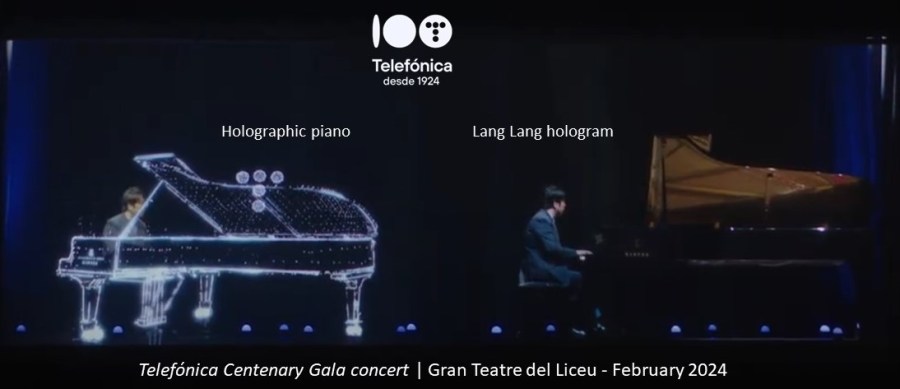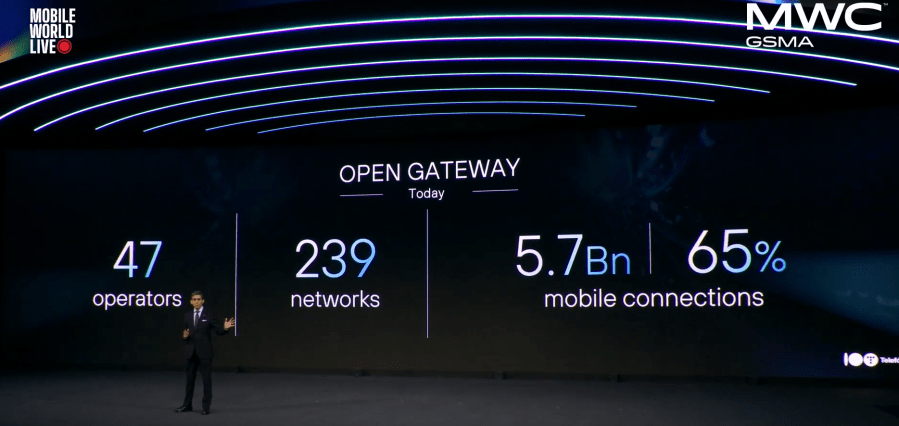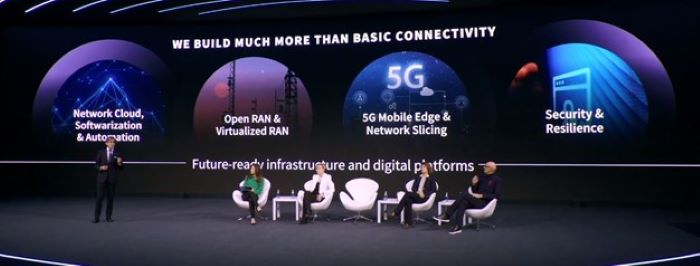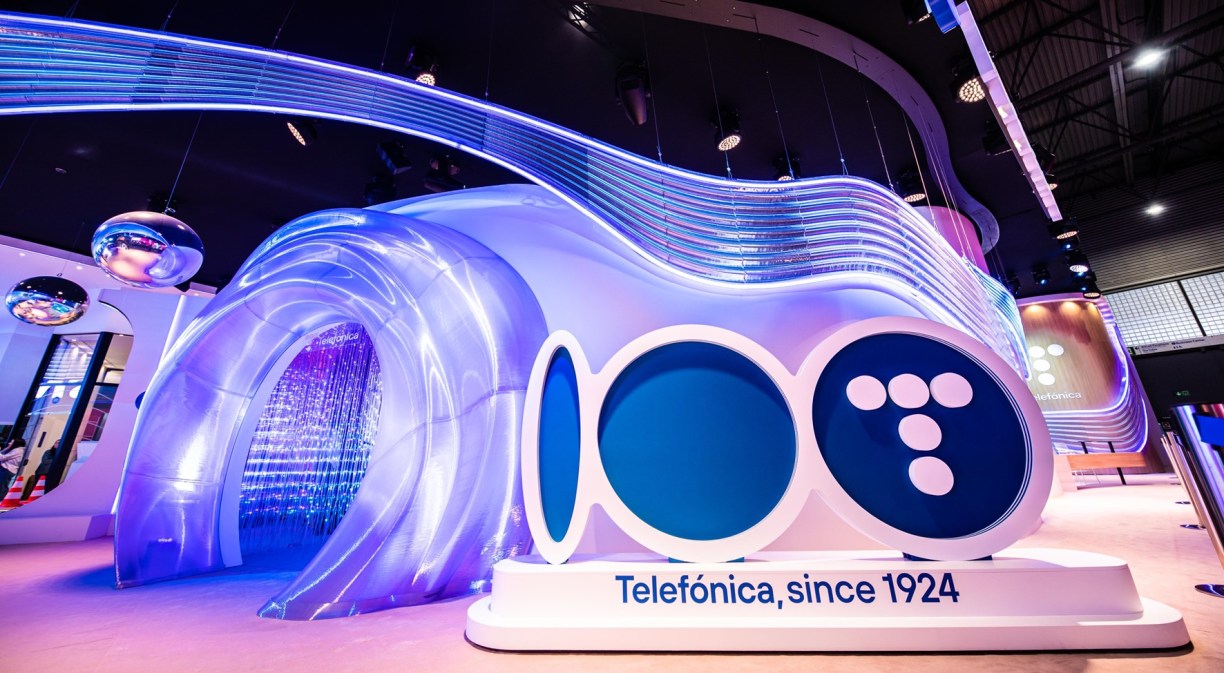The MWC24 exceeded the GSMA’s expectations with more than 101,000 attendees from over 200 countries. With Future First theme and more than 1,100 speakers in several keynotes and roundtables, it was a meeting place for senior leaders to network and learn about the latest developments in policy, connectivity and technology. As a side event, 4YFN, the innovation fair, celebrated its 10th anniversary edition, welcoming exhibitors, speakers and over 1,000 investors with collective funds of €50 billion.
Following MWC23, the MWC is establishing itself as an increasingly focused gathering for policy makers (including a Ministerial Programme with over 180 delegations from 140 countries) and business partnership, with collaboration emerging as a key word.
Telefónica welcomed its visitors in its 100th anniversary
Under the motto “Leading Change”, Telefónica welcomed its visitors to the booth showcasing the transformative power of technology, through Open Gateway, the Telefónica Edge Haptic Arena, Smart Industry: leading change, or Holographic meetings for the people. The Agora once again took the stage with talks, demos, and roundtables from high-profile speakers, with all content available on demand. For further detail on Telefónica’s presence download the brochure, browse the MWC site or watch the summary video. You can also download the transformation handbooks created for the occasion, with 26 digital transformation use cases in partnership with various industries.
To celebrate its 100th anniversary, Telefónica held a very special Gala Concert at the Gran Teatre del Liceu de Barcelona: “Let’s imagine ourselves beyond limits” with Lang Lang. It was a first-of-its-kind show that combined classical music, lights, drones, and holograms. It ended “recreating” a piano on one side and Lang Lang on the other, in real time, thanks to innovation, technology and Telefónica’s standalone private 5G network. Who was the real Lang Lang? Many spectators asked. See more in the video, programme or technology behind the concert explanation.

Connected Intelligence and Artificial Intelligence everywhere
Artificial Intelligence was omnipresent. A hype or a technology that will fundamentally change industries? Artificial Intelligence (AI) offers countless opportunities for businesses and is becoming essential for decision-making, automating tasks and processes or better serving customers, as highlighted in Telefónica’s Agora session “Beyond automation: responsible AI in business unveiled”. This session included AI for the network and the use of LLM for call centres. Other use cases such as AI in logistics and for sustainability, AI for Industry 4.0, AI for cybersecurity, AI for flow control, AI in holographic comms or AI for human resources where presented in the Agora sessions or in the demos. Partnering is becoming essential to unlock the full potential of this technology.
The governance and ethical dimension of AI was particularly present in the ministerial programme, with sessions such as ‘Responsible AI: following an ethical compass‘, where Juan Montero, Chief Public Policy, Competition & Regulatory Officer of Telefónica, addressed these issues and how industry can take proactive steps to shape ethical AI practices, including through codes of conduct.
Open Gateway acceleration
Mobile operators are really serious about opening up their networks to new functionalities and business models via APIs through Open Gateway, increasing partnership. This was the main topic of the Opening Keynote: Open Gateway: the art of what’s possible. In the Agora, first steps of Open Gateway in Telefónica were explained, as well as how to (Re)create the Future of Intelligent Digital Services or the Startup applications in ‘Wayra Unleashed: A Tale of Telco Transformation in the Open Gateway Galaxy’.

Maturing 5G use cases, new technologies and business models
Other technologies developments were presented: flying cars were the shiny limelight but 5G and 5G Standalone has become a reality evolving towards automated and softwarised networks, network slicing or edge cloud, and with use cases accelerating from drones & robots control, immersive mSurgery operations, holographic meetings, industry 4.0 with private networks, digital twin and cybersecurity or VR 360 real time use cases among other applications. More discussions were held around integration of satellite with terrestrial networks. And 6G is yet to come, but 5.5G or 5G Advanced have been mentioned in discussions, as well as Open RAN.
Wifi 6E @6Ghz has been used for several demos such as in the Telefónica Edge Haptic Arena. New device concepts were showcased, as a transparent screen laptop and rollable screen (Lenovo). The Metaverse was not so much in the conversation, even if web3 & XR use cases were shown. And new business models were presented with operators working together in Utiq in the area of advertising.
Green sustainability put into practice
Telefónica is committed to environmental sustainability and has introduced innovative elements to its stand: first of its kind recycled and recyclable plastic, produced line-by-line using vertical 3D printing robots, to reduce CO2 emissions.
Along the MWC, discussions were held around sustainability, in particular how digital technologies can improve energy or water efficiency or help recycle devices on a large scale, or how AI solutions can be used to improve energy efficiency of the network.
Policies looking for digital inclusion and economic sustainability of the telecoms industry
Investment opportunities in the telecoms sector continue to be a hot topic in the industry: infrastructure, leveraged buyouts and expanding connectivity in emerging markets, as well as making the industry sustainable. In Latin America, partnering and network sharing appears as a solution to bridge the digital gap, as was pointed in the Agora session ‘Mobile network sharing: A new development model for Latin America”.
The Ministerial Programme hosted a special session “Towards a new infrastructure investment framework”. The telecoms sector faces an investment challenge. And governments are striving for digital progress, looking to expand connectivity and infrastructure capacity, which has a multiplier effect. Global mobile data traffic is expected to grow by 54% annually from 2020 to 2030, according to ITU forecasts. And new technologies are raising the demands on network capabilities, further increasing costs. The current economic and regulatory conditions opened the debate on how to solve the existing investment gap.
And as addressed in Keynote 4 “Europe’s New Horizons”, operators offer much more than basic connectivity, in a context where the state of digital communications in Europe is in dire and Europe needs a new deal.

The priority for the European sector is to evolve to a framework that incentivises investment by allowing scale and simplifying regulation.
- Allow more scale through in-market consolidation. Moving away from initial liberalisation policies and a focus on number of operators and short-term prices towards market structures that allow for a reasonable return on investment and fair competition, thereby enhancing consumer welfare.
- Adapt regulation to new market realities. Reduce the regulatory burden on operators: Review sectoral regulation to avoid duplication and facilitate horizontal regulation (e.g. consumer, privacy, tax…) and review wholesale and roll-out barriers.
- Shift spectrum fees to network investment. Predictable licence renewals and balanced spectrum allocation are essential to maximise efficiency and value for end-users.
- Ensure fairness in the digital ecosystem. Ensure a regulatory level playing field and that large traffic generators do not abuse their market power, while promoting efficient use of networks.
- Include telecom networks in the EU taxonomy. Recognise the role of industry and digital infrastructure in the green transition for its enabling effect, while rewarding the sector’s own efforts and creating greater certainty and attractiveness for investors.
In summary, the MWC24 resulted in policy discussions to address the investment gap and sustainability of the industry and the ecosystem, collaboration and partnership between all stakeholders, and technology adoption across all sectors.
See you at the next MWC in Barcelona!









